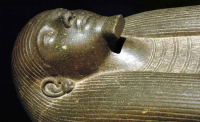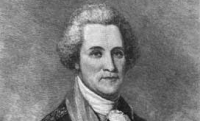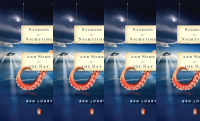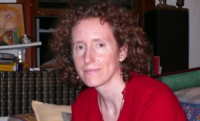Conversing with Charlotte Mandell
Charlotte Mandell
From the classics of Marcel Proust, Honoré de Balzac, Guy de Maupaussant, Gustave Flaubert and Jules Verne to contemporary works by Jean Genet, Maurice Blanchot, Jacques Rancière, Bernard-Henri Lévy… the list of French authors and works that Charlotte Mandell has translated is diverse yet solid. An award-winning translator of French literature and philosophy, Mandell has been translating since 1990. Working in two languages has been her approach towards understanding thoroughly the literary essence of each oeuvre. How different is a translator’s life from that of a writer? In this October issue, she shares with Greta Aart about her art as a French translator.
Among Charlotte Mandell’s forthcoming translations are Pierre Bayard’s Sherlock Holmes Was Wrong (L’affaire du chien des Baskerville, 2008) and Jonathan Littell’s The Kindly Ones (Les Bienveillantes, 2006). Both translations are published respectively byBloomsbury USA (October 2008) and HarperCollins (March 2009). You can also visit her website.
Translation is a test of patience and perseverance that seeks some sort of transparency in-between languages. How do you define translation?
A translator is a medium. Before starting to translate, a translator tries to empty him/herself out, absorb the text, and then speak the text anew in his/her own language.
A translation should sound as fresh and new as the original text. It should never sound like ‘translationese’, something that’s neither French nor English. It should sound as if it were breathed in the ‘into’ language. In a way, all language is translation; we try to convey the ‘original’ language of mind and body into words. The translator’s job is to make everything sound ‘original’.
What attracts you to the craft of translation?
I love reading, and I think translating is the truest form of reading. People are always asking me if I write my ‘own’ work. I find it hard to convey to them that I feel no need to write—II would much rather ‘be’ a lot of different authors by translating them. I never read ahead when translating, so translating for me feels like more of a creative process: I have no preconceived notions of how the book will end, and can put myself in the author’s place by trying to imagine what will come next.
Ibn Battuta speaks and says, A translation by Charlotte Mandell
By doing so, do you risk translating in an incoherent voice, a language style that varies from place to place? Your approach seems rather daring!
Actually I know quite a few translators who work the way I do. If the book is written in one coherent voice, there’s no risk of losing that as I translate. On the contrary, it sounds much more alive and new, since I’m translating the same way the author wrote. The author couldn’t read his book ahead of time as he was writing it! Why should a translator be any different?
That said, I do a lot of revision after I finish a first draft. I usually end up with three or four drafts of one text before I’m happy with the final version.
As a French translator, you have an intimate relationship with French as a language and a culture. How did it become such an important part of your life? Having English as your mother-tongue, how do you balance the demands of both languages?
My parents were both university professors when I was growing up, so we had long summers off, which we started spending in French-speaking Switzerland. I also spent time in France, when I was little. In high school, I concentrated in French, Latin, and ancient Greek, and then majored in French at university, spending a year of study in Paris. I went to Bard College, where all seniors have to write a thesis-length work (a ‘senior project’). Mine was a translation of a book of poems by French poet Jean Paul Auxeméry, le feu l’hombre (translated as Fire Shadows.) Auxeméry himself is also a translator, and has translated poets like Charles Olson, Robert Duncan and Robert Kelly.
As to balancing the demands of both languages, that’s an interesting question…I wish I could spend more time in France. As it is, I watch the French news every day on TV5 via satellite, so I can keep up-to-date on the news in France. (I translate news articles occasionally for The New York Times and the Wall Street Journal Europe.)
Do you encounter cultural barriers or baggage that are difficult to approach during your process of translating? Do you believe that it is indeed possible to translate languages, literally and culturally?
I think a few authors (a very few) are impossible to be translated well: Racine, for example, since the sound of French is so important to his poetry. Conversely, I can’t imagine a convincing Finnegans Wake in French, or Flann O’ Brien’s great At Swim-Two-Birds.
I’ve been fortunate in that I haven’t yet encountered an untranslatable text. I think dialects and cultural references can all somehow be conveyed in the translated language; the most important thing is the voice. If I can find the voice in English, and make it sound convincing, everything else follows from that.
At the moment, what are you working on?
I just finished going over the copy-edited proofs of The Kindly Ones, my translation of Jonathan Littell’s Les Bienveillantes. My translation of Pierre Bayard’s L’affaire du chien des Baskerville, called Sherlock Holmes Was Wrong: Reopening the Case of the Hound of the Baskervilles, is forthcoming from Bloomsbury USA next month.
Some other recent projects include a beautiful meditation on sleep, The Fall of Sleep by Jean-Luc Nancy (Fordham), as well as two books by the Tunisian poet, novelist, and essayist Abdelwahab Meddeb, Tombeau of Ibn Arabi andWhite Traverses (both from Fordham). My translation of Proust’s Pastiches (which to my knowledge have never been translated into English before), The Lemoine Affair, has just been published by Melville House. And I recently translated a wonderful excerpt from the new novel Zone by Mathias Enard—I hope that finds a publisher in America or the UK, since there’s nothing like it out there. I would love to be able to translate the whole book.
“In a way, all language is translation;
we try to convey the ‘original’ language of mind
and body into words.“
You’ve also mentioned having “no need to write” —would you think that your loyalty to translation may hinder your own will to write, if you were to contemplate starting from a blank page, without an original text or language as a cross-reference or interpretation? Creation versus re-creation. Would you also like to write?
But my point is that translation is also a form of creation. It’s not just recreating what’s already been written—it’s creating the text anew, in my language. That’s why I don’t feel the need to write my own work; I feel fulfilled writing in many different voices, the voices of the authors I translate. It’s interesting that classical musicians aren’t usually asked if they also compose, but they’re a lot like translators, in that they play many different styles of music, and the interpretations can vary hugely from one performer to the next.
I think all writing starts from a blank page, originals and translations alike. For me, all writing is creative. A poet writing about the sunset and the trees is translating his/her thoughts and impressions into words. All writing is translation, in a way.
Some may say that not many translators are or can be confident or good writers, the same way that not many translators can write well. Any thoughts on this?
Actually I know quite a few good writers who are also translators: Lydia Davis, Paul Auster, John Ashbery, Cole Swensen, Pierre Joris, Robert Kelly, Schuldt, Clayton Eshleman, Jacques Roubaud–all are wonderful writers and excellent translators. Beckett was a great translator. Ezra Pound, Paul Blackburn, Baudelaire, Proust all translated.
On the other hand, one can also be a good translator and not be a ‘writer.’ I think a good translator is a good writer, period. A bad translator is a bad writer.
You’ve translated various literary genres—novels, short stories, philosophical essays, and poems. Would you be interested in translating French plays?
I would love to translate plays, but no one has ever asked me to. I love Beckett and Ionesco. I suppose I like translating poetry most, since there are so many different ways of translating poetry. I feel I can be freer and more creative in my poetry translations. But I also enjoy translating novels—translating Les Bienveillantes was exciting, since I never knew what was coming next! I also came to inhabit the character of Max, since I lived with the book for such a long time, and translating in his voice became very absorbing. And I love translating essays by Blanchot and Nancy, since I can see the author thinking as he writes—it’s a wonderful feeling to be able to convey that same thinking in my own language.
How much communication and exchange do you have with the authors whom you’ve translated?
Sometimes none at all—it depends on the book, and the author. I have a close collaboration with Abdelwahab Meddeb, since I’ve been translating him for so long, since 1992. I also worked extensively with Bernard-Henri Lévy on the articles he wrote for the Atlantic Monthly. These articles were later compiled into the book, American Vertigo, which appeared in English before it was published in the original language in France. And I’ve worked closely with Jonathan Littell on my translation of The Kindly Ones; that was the first time I’d worked with an author whose original language was English.
“A translation should sound as
fresh and new as the original
text. It should never sound like
‘translationese’…”
You’ve also attempted translating your husband Robert Kelly’s poems from the English to the French. Is dabbling in such “inverse translation”more challenging to you?
You say ‘attempted’—I hope they’re not complete failures! Yes, since English is my original language, it is harder to translate into French, and I would only do it with poetry, never with prose. I felt I could do it with Robert’s poetry since I know the work so well, and I feel it’s all right if poetry sounds a little odd—poetry sounds odd in English too. I like how poetry makes the reader think, and that oddness might make him/her think a little more. I also got help on the French from some French friends of mine who teach at Bard, Odile Chilton and Eric Trudel (with whom I co-translated a book of essays by Jean Paulhan, On Poetry and Politics).
What does your typical working day look like?
I like to work at night. My mind is clear then, and things are (mostly) quiet, including the dreaded terrorphone. I’m a Buddhist, so I spend mornings engaged in various meditation practices. I don’t usually start work until late afternoon, and then I work on and off into the night.
It may sound odd, but translating is an exhausting job, since it requires so much concentration. So if a text is particularly difficult (Blanchot, for instance), I can’t translate for more than a few hours a day. I love being able to structure my own day and work at home—I live in the country, in a beautiful region of New York State called the Hudson Valley, and it’s nice to be able to take a break and go for a long walk in the woods with my husband when I’m working on a difficult project.
When you say that certain texts are “difficult” (such as Blanchot), are you hinting at difficulties in terms of finding the right lexicon? Or is it about the ideas and their density?
CR: Robert Kelly
Both, really. With Blanchot the difficulty lies more in the ideas and their density, as you say; his vocabulary is for the most part deceptively simple. So I have to keep that seeming simplicity in English but convey the complex ideas behind it. With Nancy, there’s a lot of wordplay that necessarily gets lost in English. Sometimes I can duplicate it, but usually I have to add footnotes to explain the puns.
Monte Alban, A Translation by Charlotte Mandell
Concerning the silence of translators, why are they so often overlooked or comparatively ‘little’ credited in our society? What do you think can help lend them a stronger literal and social voice?
That’s such a difficult question, especially in America, which is such a monolingual society. It is often said that translated books don’t sell as well as ‘original’ books, so sometimes publishers try to downplay the fact that a book was translated. There’s a good amount of xenophobia in the publishing world, I think. I’m a member of the PEN Translation Committee, which tries to stress the importance of royalties for translators, for example. But it will be a long time before translators are regarded as being as important as the authors they translate. Which is ironic, since without us those authors wouldn’t exist in English!
You’re such a passionate reader. What are the top titles currently on your personal reading list?
I’ve just finished reading the Everyman’s Library edition of the collected Flann O’Brien novels—wonderful! I especially loved The Third Policeman and At Swim-Two-Birds. Now I’m reading several different books at once: a book of stories by different people who influenced C.S. Lewis (including one of my favorites, George MacDonald) called Tales Before Narnia; Robinson Crusoe and Proust’s Jean Santeuil, the book he wrote in preparation for writing A la recherche du temps perdu. I’ve also just finished re-reading Robert’s new novel, The Book from the Sky, just out from North Atlantic.
–
–
Greta Aart is the nom-de-plume of Fiona Sze-Lorrain, who previously edited for Emprise Review and now edits at Cerise Press.









